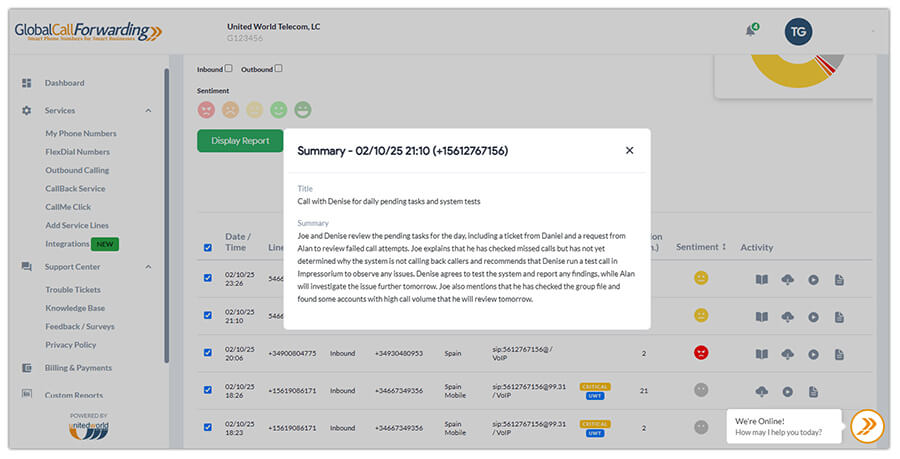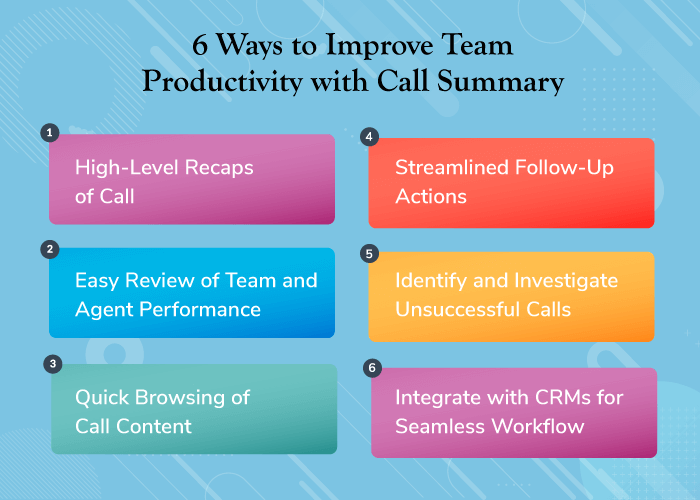Tired of searching through hours of call records to determine call outcomes? Looking for a way to quickly capture key insights from every customer interaction?
Call Summary, an AI call feature, is designed to save time and highlight key takeaways by summarizing call content. This AI-powered feature provides concise, AI-generated recaps of every call, saving you time by turning lengthy call records into brief, easily readable summaries.
Now you can have immediate access to important takeaways, action items, and crucial customer insights—within minutes of a call. Call summaries aim to maximize the potential of your customer discussions, not only save time.
Let’s dive into how call summary can transform your workflow.
- How AI-Generated Summaries Work
- GCF Feature: Call Summary
- 6 Ways to Improve Team Productivity with Call Summary
How Do Call Summaries Work?
A call summary is an AI-driven feature that provides quick and concise overviews of your inbound and outbound business calls. By condensing conversations into key discussion points, summaries help teams quickly grasp the essence of every conversation. This eliminates the need to assess entire call recordings or transcripts.

By integrating call summaries into the workflow, businesses can drastically reduce inefficiencies and prevent misunderstandings. This integration helps maintain high levels of customer satisfaction.
Key components of a summary include:
- Primary Discussion Points: Key topics covered during the call.
- Actionable Insights: Highlight any particular tasks or follow-ups mentioned during the call.
- Call Metadata: Date, time, language, and participants involved in the call.
Importance of Call Summaries in Business Communication
Call summaries improve business communication and workflow by streamlining call management and analysis. At the same time, it encourages agent accountability, clarity, and efficiency. Let’s look at how summaries can ease your workflow:
- Quicker Decision-Making: These summaries can provide immediate access to critical information, helping teams make decisions more quickly and intelligently. Teams can use these summaries to determine next steps and improve their strategies.
- Summarized Call Content: They provide customer support agents with a succinct and straightforward synopsis of customer interactions. This results in more personalized service and improved client-business relationships.
- Communication Efficiency: Employee productivity and efficiency are increased as they can immediately access the most crucial details of each conversation rather than relying on manual notes or listening to entire recordings.
- Facilitating Accountability: They ensure accountability by emphasizing actionable items and encouraging ownership or follow-ups. They reduce misunderstandings and provide stakeholders with precise, documented information for easier collaboration and fewer conflicts.
- Better Quality Assurance: They allow managers to evaluate agent and team performance and call quality rapidly.
- Streamlined Onboarding: Reviewing summaries helps new team members quickly grasp frequent problems and efficient communication strategies. Managers can identify these calls to use within training sessions.
Call Summary: A GCF AI Insights Feature
Businesses always rely heavily on actionable data. An organization’s performance entirely depends on its ability to understand call patterns, customer behavior, and overall communication. This is where the Global Call Forwarding AI Insights feature comes in.
Our AI Insights feature comes with a Call Summary, Sentiment Analysis, and Call Transcription, giving businesses a real-time glimpse of their call interactions. It delivers essential insights that assist companies in evaluating performance and enhancing customer relationships, going beyond the basic call log data.
The summary feature automatically processes calls and generates summaries post-call. These call summaries are available in the control panel’s AI insight dashboard.
You can extract deeper, hidden insights and opportunities from customer calls when you use this feature alongside Sentiment Analysis and Call Transcription. For instance, quickly identify calls with negative sentiment ratings and read entire transcripts to better understand what went wrong.
Use summaries to also find recurring trends or issues brought up in customer conversations related to product feedback, complaints, or requests for additional features. Understanding these patterns can help you take proactive action.

6 Ways to Improve Team Productivity with Call Summary
With Call Summary, skip the hassle of listening to every conversation for training or performance evaluation. You can effortlessly track call performance with summaries across multiple phone lines, departments, and teams. Quickly access key information, from sales pitches and customer support inquiries to prospect follow-ups and team meetings. Your teams can then quickly address customer concerns and enhance response times.
Here are a few effective ways to use call summaries to improve team productivity:
1. High-Level Recaps of Call
Call summaries give your team a concise overview of each call. They ensure no important details are overlooked and allow prompt decision-making without requiring team members to listen to the complete recordings. Additionally, AI-driven VoIP insights help identify trends, customer sentiments, and recurring issues, enabling your business to refine communication strategies and improve overall customer experience.
2. Easy Review of Team and Agent Performance
Summaries make it simple for managers to evaluate team and agent performance. They help pinpoint both areas of strength and need for development. You can read summaries across specific locations and departments. This improves team productivity overall.
3. Quick Browsing of Call Content
Managers and agents can rapidly review the summary to find key takeaways rather than listen to lengthy calls. They can then decide to dive deeper with call transcripts and recordings, if a need arises. This saves team members time by keeping them informed and involved in crucial discussions.
4. Streamlined Follow-Up Actions
Call summaries highlight action items to ensure nothing is overlooked. Teams can improve workflows and response times by using this to prioritize follow-ups and maintain task organization.
5. Identify and Investigate Unsuccessful Calls
Not all calls necessitate a thorough review. By using summaries, you can instantly identify calls that could require more attention, allowing your team to concentrate on the most critical tasks. For more detailed insights, review sentiment analysis, transcripts, and recordings. Managers and agents can better understand the emotions and responses of customers.
6. Integrate with CRMs for Seamless Workflow
Take your customer and call analytics to the next level by using our CRM integrations. By combining your CRM and phone system, you can automatically sync call activity across both platforms. Bring your CRM call activity to our control panel and use our AI insights features to gain actionable insights.
Drive Business Growth with AI-Powered Call Summaries
Transform your call traffic into actionable intelligence. AI Call Insights automatically extracts your inbound and outbound calls’ key topics and customer emotions, which reveals insightful patterns and makes targeted coaching possible.
Improve productivity and enhance customer communication with this call analytics solution. Start leveraging AI-powered call Insights in your company. Try Call Summary and other AI Insights features with Global Call Forwarding!
Contact our experts today to learn how AI-powered call summaries can transform your business operations.






